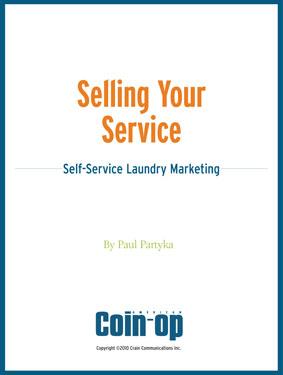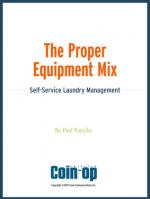Fostering Teamwork in the Laundry (Part 1)

CHICAGO — Facing a tighter labor market over the last few years, hiring and keeping attendants that work well with others is as important as ever to today’s self-service laundry owners. One way to help that part of your business is to create and sustain an environment that supports staff and encourages them to work together for the common cause.
To hear a bit about their stance on teamwork and the steps they take to inspire store managers and attendants to work as a unit, American Coin-Op interviewed a trio of veteran store owners from around the country.
Yvette Morton Williams is president and chief inspiration officer for a small chain of upscale metro Atlanta laundromats that employs more than 20 people. Among the group’s offerings are a 5,000-square-foot full-service store that offers wash-dry-fold and some smaller, self-service stores that are “mostly staffed.”
Good teamwork makes a business a pleasant place to work, Williams believes.
“If you have to spend so many hours in any given place, you want to hopefully enjoy it, enjoy the people that you're with,” she says. “It’s real important for us because it lets our customers feel the positive vibes all over, so every touch point, it just makes for a better customer journey when we have good teamwork.”
Describing himself as a “fully diversified laundry professional,” Patrick Dreis owns three Southern California laundromats and a commercial plant where his staff processes fluff-and-fold orders.
“At the laundromats, our team members usually work alone. At the commercial plant, they work side by side. It does make for differences in how these people are managed,” he says. “At the mats, it’s more about customer service. They need to be able to communicate effectively, so, all our team members are bilingual. At the plant (we call it the Castle), they work much more closely with the same people every shift.”
Tom McEwen Jr. has an ownership stake in two unattended stores in the Rochester, New York, area, but recently sold an attended store where five employees split shifts with no more than one on duty at any given time.
“You want to hire somebody that will bring a ray of energy and sunshine into the place when they come,” Williams says. “I look for longevity in their previous roles because that tells me if you aren't a good team member, more than likely you haven’t been able to maintain a job for any period of time.”
She looks for management experience or a history of promotion because that indicates they were valued where they were: “It’s an unusual workplace that will promote somebody who’s not good at teamwork.”
Dreis says he’s just begun asking new interview questions of job seekers.
“I’m borrowing/stealing them from a (convenience store) company called Kwik Trip: ‘1. Tell me about your last random act of kindness. 2. Tell me about your volunteer work in the community.’ I just want to work with nice people.”
“Communication was very important” to his staff working as a team, McEwen reflects.
“They would help each other between shifts,” he says. “Every now and then, there was a little ruffle of feathers where one attendant wouldn’t like talking to one of the others, a personality conflict.”
But apart from those rare occasions, staffers would consult one another at shift change to describe the work that had been done or was being done, review a quick inventory of supplies, learn if any customers had presented a problem, etc.
“You want to make sure that (your attendants) have some sort of continuity of duties,” Williams concurs. “In the smaller stores, there generally aren't two people working at the same time, so it's especially important that they're able to explain what happened in the shift before them or leave a note.”
She places a premium on attendants who are skilled at written as well as oral communications. If there is a gap between the next attendant coming on duty and them, it’s not unusual for her attendants to text one another or use the chain’s GroupMe group chat to pass along key information.
The consistent reinforcement of store procedures is important to customers, says Williams, “because they will come to expect the same type of interaction with our team no matter who's there.”
“At the mats, I leave written pages with projects, notes, info they need,” Dreis says. “We’ll also have some face-to-face, ‘all hands’ meetings. At the Castle, we have production meetings at the beginning of each shift. They’ll review all the orders in process and scheduling for pickups and deliveries.
“I think just being nice and fair with everyone is pretty basic advice. Have a plan, explain their role, and then let them work. I try not to micromanage.”
In Thursday's conclusion: Rewarding teamwork, and what these owners ask of themselves when building their team

Tide, Walmart Team Up to Expand Adoption of Washing in Cold

Finding Success by Sidestepping Pitfalls (Conclusion)

Record Cash Flows Part of Latest EVI Financial Results

Finding Success by Sidestepping Pitfalls (Part 2)

TCATA Installs New Leadership, Honors Long-standing Members

Finding Success by Sidestepping Pitfalls (Part 1)

Laundrylux Distribution Opens New Fulfillment Center

Communicating Expectations Through Your Employee Handbook (Conclusion)

Royal Basket Trucks Earns Workplace Honor

Communicating Expectations Through Your Employee Handbook (Part 2)
Podcasts for You
Successfully Marketing Your Coin Laundry on a Budget

Dennis Diaz, president of digital marketing firm Spynr, talks effectively promoting your laundry business using social media and some old-school basics.
The Man Behind the Clean Show

Retiring show manager John Riddle talks Clean history and reminisces about his long career, including his time in pro baseball, stadium management, rodeo production, and more.
Pricing Strategies

Russ Arbuckle, president of distributor Wholesale Commercial Laundry Equipment S.E., talks pinpointing the factors that may signal when it’s time to raise a laundry’s vend prices.
From the Research Center
Selling Your Service: Self-Service Laundry Marketing

The Proper Equipment Mix: Self-Service Laundry Management

Designing Your Store: Self-Service Laundry Management

Latest Digital Editions
Digital EditionAmerican Coin-OpMay 2024

- Finding Success by Sidestepping Pitfalls
- Fostering Teamwork in the Laundry
- Product Showcase: Vended Dryers
- Pointers from Paulie B: Adopting a Proactive Store-Cleaning Policy

